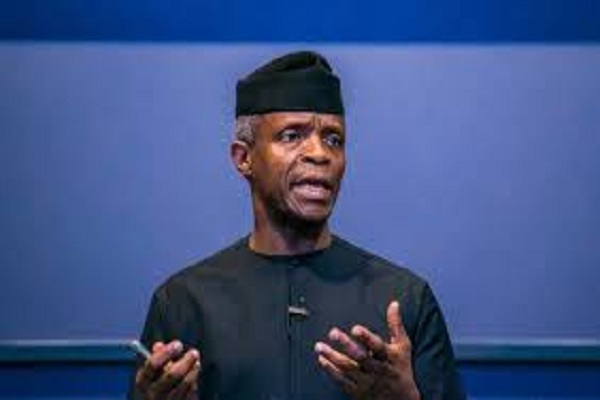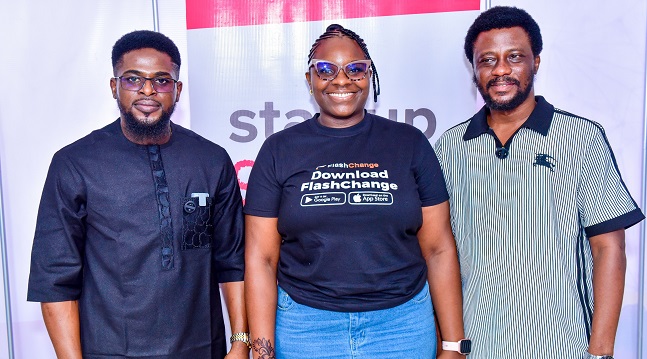News
Startups Ecosystem Critical To The Future Of Nigeria – Osibanjo

The Vice President of Nigeria, His Excellency Professor Yemi Osibanjo, said that startup ecosystem is one of the vital tools in finding solutions to Africa’s various challenges, according to him, these challenges will determine if the continent’s future as the next frontier for economic opportunities will fully be realised.

The VP, represented by Director General, National Information Technology Development Agency (NITDA), Mallam Kashifu Inuwa Abdullahi, said this at the Startup and Developer event organised by Google.
He stated the topic – The African Start-up Ecosystem Opportunity – is exciting because startup ecosystem is extremely critical to the future of Nigeria and Africa at large.
“Globally, the Startup ecosystem is the most viable platform for innovators and entrepreneurs to take their ideas from inception to impact.
“It brings relevant stakeholders together to collaborate and bring something new to the world or new to an industry.
“There will never be a more perfect time to strengthen the African startup ecosystem than now, on the verge of the 4th industrial revolution,” he said.
Osibanjo noted that the 3rd industrial revolution was pivotal to unprecedented global economic growth in the 21st century, as it disrupted traditional service delivery channels and accelerated the automation of factories and manufacturing processes, using electronics and information technologies to expand the reach and create prosperity but Africa hopped along and missed out.
“The countries that captured maximum value from the 3rd industrial revolution have become more prosperous and built solutions that improved service delivery in all aspects of lives, from education, healthcare and food production to efficiency and speed in manufacturing.
“Today, Africa is presented with another opportunity, the 4th industrial revolution, which is shaping and creating economic activities.
“It is proving to be the catalyst for future economic activities that will bridge the divide between rich and developing countries, and remove physical borders and barriers while maximising the utilisation of digital technologies as a source of inspiration across economic sectors,” he added.
“The African startup ecosystem opportunity is hinged on two key factors, which are anchored on the 4th industrial revolution and driven primarily by digital technologies. The first factor is innovation capacity, and the second one is entrepreneurial capacity.
“Both capacities depend on four key indicators, Human Capital, Infrastructure, Funding and Demand. Human capital being the first indicator means that African startups must realise that they are only as strong as the value of the human resources they have.
“Therefore, startups like Andela, Wootlab Innovations and Decagon are vital as they are involved in producing skilled talent.
“With this, Africa can become the next hotbed for professional talent that will provide local solutions and export their skills and solutions to a global market that actively seeks such value.
“This is why we highly valued Google Developer Space in Lagos. It is the first in Africa and speaks to the position of Nigeria as a leader in the digital skills and startup ecosystem in Africa. The investments attracted by our startups confirm the position.
“Recently, Flutterwave announced new funding of $170m, and Stripe acquired Paystack for more than $200m. Other Nigerian technology companies like Interswitch have raised funding in hundreds of millions of dollars,” he noted.
The VP stated that according to startup Genome report, Lagos is the most valuable startup ecosystem on the continent, having 400 to 700 active startups valued at over $2B with Fintech being the most prominent in the Lagos technology startups ecosystem.
However, other industries are emerging with startups like Flying Doctors, 54gene, Helium Health and Life Bank blazing the trail in the healthcare sector and Thrive Agric, Afex Commodities, and Probity Farms making waves in the agriculture and commodities exchange space.
He said the opportunities for investment and disruption remain very high in the continent; same as the opportunity for hubs and other innovation centres to serve as enablers and anchors for our promising startups.
“As Government, we are working with the relevant stakeholders in the public and private sector to ensure that startups receive every support they require to take their ideas from inception to impact.
“As part of our Ease of Doing Business Reforms, we instituted the Visa on Arrival Policy which allows any person outside ECOWAS to get a visa on arrival in Nigeria.
“This policy means all African startups and entrepreneurs seeking to expand their business into Nigeria will have a more straightforward process.
“We are also re-convening the Technology and Creativity Advisory Council, made up of public and private sector stakeholders in the ecosystem to advise Government on policies and programs to support the ecosystem.
“Through the work of this council, we are currently engaging with the African Development Bank to setup a $500million US Dollar Innovation Fund, which will provide support for the ecosystem across four pillars which include Infrastructure support, Finance, Skills Development and Technical Assistance.
“In 2019, the Federal Government of Nigeria launched the National Digital Economy Policy and Strategy (NDEPS) for Digital Nigeria as a sustainable roadmap to accelerate the development of the Digital Economy in Nigeria.
“The policy is designed to catalyse the digital ecosystem development in Nigeria and deepen innovation quality to promote innovation-driven enterprises that target the global market.
“We also have many initiatives to support the ecosystem through various agencies. In this regard, the National Information Technology Development Agency (NITDA) has been at the forefront of supporting Nigeria’s digital innovation ecosystem. Last year, as the COVID-19 pandemic wreaked havoc worldwide, NITDA engaged the ecosystem to devise strategies to aid business continuity for startups and developed schemes to support and sustain the ecosystem.
The engagement led to initiatives such as Technology Innovation and Entrepreneurship Support (TIES) Scheme, National Centre for Artificial Intelligence and Robotics, National Innovation and Entrepreneurship Center etc, as sustainable programmes to continuously up-skill and supports the startup ecosystem.
“Secondly, the Nigerian Export Promotion Council introduced the Export Expansion Grant, which can be accessed by companies with a minimum annual export turnover of N5 million. This is particularly useful to Nigerian startups seeking an expansion into other African countries and those seeking to take advantage of the African Continental Free Trade Area.
“Other opportunities, such as the Central Bank of Nigeria’s Creative Sector Loan in collaboration with the Bankers’ Committee and the Bank of Industry’s Technology Fund, are designed to create different ways through which startups can access the value they need to keep expanding their businesses.
“I must further re-iterate that there is no exhaustive list of approaches to make sure our Government creates an enabling environment. For example, we are working through the Federal Ministry of Communications and Digital Economy to deepen digital identity through NIN registration and build broadband infrastructure backbone across the country, this is part of our National Broadband Plan, which is designed to deliver data download speeds across Nigeria of a minimum 25Mbps in urban areas, and 10Mbps in rural areas, providing access to at least 90% of the population by 2025 at affordable prices.
“Broadband infrastructure and digital identity are two critical factors that accelerate the digital economy. These are all avenues aimed at inspiring our startups to disrupt the conventional ways of service delivery,” he concluded.
News
AfDB Supports Francophone Africa Start-ups with €6.5M

The African Development Bank Group last week approved an investment of €6.5 million in the Saviu II fund in order to support technology start-ups through their seed phase and first institutional fundraising, mainly in French-speaking Central and West Africa.

The Bank will invest €4.5 million as equity and €2 million as a first-loss hedging tranche on behalf of the European Commission, under the Boost Africa Programme.
This participation of the Bank Group will enable the Saviu II fund to give priority to companies with a strong technological or digital component.
Saviu II, the second investment vehicle of Saviu Partners, plans to invest between €500,000 and €3 million in about 20 technology or technology-oriented business-to-business start-ups in the seed phase or carrying out first institutional fundraising.
The Saviu II venture capital fund aims to make at least 60% of its commitments in the French-speaking countries of West and Central Africa: Côte d ‘Ivoire, Cameroon, Benin, Senegal, Togo, Burkina Faso and Mali.
The fund can also co-invest in promising technology companies in East Africa that have a strong team and business model, and whose strategy includes entering the market in French-speaking West African countries and establishing a strong presence there.
In addition, the fund will devote a dedicated envelope to pre-seed investments, focusing on minority equity investments, usually in co-investment with studios, incubators or other ecosystem partners.
News
TeamApt, Awabah Partner to Boost Pension Drive for Nigerians

TeamApt Ltd., a subsidiary of Moniepoint Inc. and a leading financial infrastructure provider, has partnered with Awabah, the National Pension Commission’s first licensed Accredited Pension Agent, to expand pension access for millions of Nigerians in the informal economy.

The partnership was unveiled in Abuja at the launch of Awabah’s agent licence, themed “Building Financial Resilience: Securing the Future with Personal Pensions.”
At the event, PenCom Director-General Omolola Oloworaran underscored a major imbalance in Nigeria’s pension system, noting that while pension assets have grown to over ₦27 trillion, the benefits remain largely concentrated among formal-sector workers. She observed that most informal-sector workers—who make up the majority of Nigeria’s workforce—still retire without any form of savings.
This challenge is further highlighted in Moniepoint’s 2025 Informal Economy Report, which reveals that although 65 per cent of informal businesses recorded revenue growth, most lack the structural resilience required for long-term sustainability and succession.
Through the partnership, TeamApt—a Central Bank of Nigeria–licensed switching and processing company—will enable seamless pension registration and contributions for Awabah users via its Direct Debit service on Point of Sale (POS) terminals nationwide. Informal workers can enrol for personal pensions, tokenize their cards, and automate periodic contributions in just a few steps.
The initiative simplifies pension savings by turning what was once a complex, bureaucratic process into a routine transaction, enabling business owners and workers to build financial security beyond their productive years.
“When we started Awabah, we were driven by one core belief—that no African worker should be one accident or crisis away from poverty,” said Tunji Andrews, Chief Executive Officer of Awabah.
“This partnership with TeamApt allows us to scale that vision. By leveraging their Direct Debit service and extensive POS network, we are meeting informal workers where they already operate—markets, workshops, kiosks, and roadside businesses. With small, regular contributions, workers can now access personal pensions bundled with health, accident, and life insurance,” he added.
TeamApt CEO Dennis Ajalie said the collaboration aligns with the company’s long-standing mission to power Nigeria’s informal economy.
“At TeamApt and Moniepoint Inc., our focus has always been on enabling the informal sector,” Ajalie said. “Today, working within our licence framework and alongside our co-subsidiary, Moniepoint Microfinance Bank, we operate across all 774 local government areas, serving millions of Nigerians who drive economic activity.”
He described the partnership as a critical step toward pension inclusion, adding that it demonstrates how financial infrastructure can deliver real, long-term value to everyday Nigerians.
Ajalie also praised PenCom’s leadership for creating an enabling environment for innovation, noting that Oloworaran’s reforms have opened the door for partnerships capable of delivering sustainable pension coverage for informal workers.
The initiative is powered by TeamApt’s robust financial technology ecosystem, which has supported banks, fintechs, and financial institutions for more than a decade. Its omni-channel Direct Debit service allows automated recurring collections—such as pension contributions, subscriptions, and repayments—directly from customers’ bank accounts with their consent.
Beyond pensions, the platform enables informal workers to automate investments in the capital market, access healthcare through HMOs, and secure insurance coverage for themselves and their families—extending financial security far beyond retirement.
News
FlashChange CEO, Bidemi Oke, Urges Startups to Build Strong Governance Structures Early

FlashChange, Africa’s fast-rising digital asset management and cross-border payment platform, had its Chief Executive Officer, Bidemi Oke, featured as a speaker at the latest edition of Startup Grind Lagos, one of the largest global communities for entrepreneurs and innovators.

Held on Saturday, February 28, 2026 in Lagos, the event convened founders, investors, developers, and ecosystem builders for a candid conversation on innovation, resilience, and scaling technology ventures in emerging markets. Oke shared insights from FlashChange’s journey building a trusted digital finance brand in Nigeria’s evolving fintech and crypto landscape.
During the fireside chat, Oke shared practical lessons from scaling FlashChange in a highly regulated and fast-changing environment. He emphasized the need for startups to build strong governance structures early, maintain open communication with regulators, and design solutions that solve real economic pain points, particularly around remittances, foreign exchange access, and digital asset utility.
“In markets like Nigeria, trust is not a marketing slogan, it is the product,” Oke said: “For us at FlashChange, growth has always been tied to transparency, compliance, and delivering consistent value to users navigating cross-border payments and digital assets.”
He also addressed the broader opportunity within Africa’s fintech ecosystem, noting that innovation on the continent must balance speed with responsibility.
“The next phase of African fintech will be defined not just by who grows fastest, but by who earns and keeps user confidence. Founders must think beyond valuation headlines and focus on building institutions, he added”
“Innovation is important, but sustainability is critical. At FlashChange, we are building for the long term” Oke noted.”
The session featured an interactive Q&A session where participants engaged him on several topical issues. He underscored the importance of proactive communication, especially in industries where misinformation and volatility can quickly erode public confidence.
Startup Grind Lagos Director, Mayokun Adeoti while commending Oke for offering practical, founder-focused insights, he said, “His experience provides valuable lessons for startups building in complex regulatory environments.”
FlashChange has continued to position itself as a reputable voice within Nigeria’s fintech and digital asset ecosystem, advocating for regulatory clarity, financial literacy, and secure transaction infrastructure. The company’s participation in Startup Grind Lagos reflects its commitment to contributing meaningfully to conversations shaping the future of innovation in Nigeria.
The Startup Grind Lagos appearance marks another milestone in FlashChange’s thought leadership journey and reinforces its growing role in Nigeria’s digital finance ecosystem.

 E-Financial1 day ago
E-Financial1 day agoMutual Benefits Assurance Reaffirms Full Regulatory Compliance, Enhanced Governance

 E-Financial1 day ago
E-Financial1 day agoIran-Israel-US Conflict and CBN’s FX Gains: A Stress Test for Nigeria’s Monetary Stability

 General News1 day ago
General News1 day agoSERAP Asks FCCPC to Investigate Google, Meta, Others over Alleged Rights Abuses

 General News1 day ago
General News1 day agoJAMB Uncovers AI-Driven Fraud Targeting UTME Candidates, Warns Parents

 News1 day ago
News1 day agoFlashChange CEO, Bidemi Oke, Urges Startups to Build Strong Governance Structures Early

 News1 day ago
News1 day agoTeamApt, Awabah Partner to Boost Pension Drive for Nigerians

 General News1 day ago
General News1 day agoCapelli Institute Commits to Advancing Trichology in Nigeria

 E-Financial1 day ago
E-Financial1 day agoReps Mull Commission to Regulate Fintech Operations



























